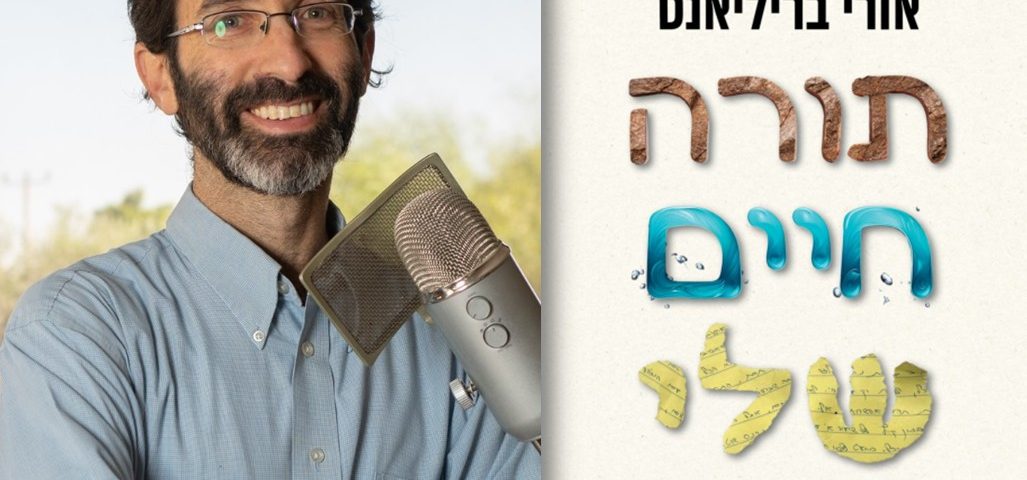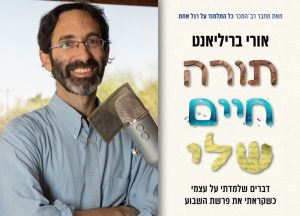Alt+SHIFT: Torah Hayyim Sheli

Yitzchak Blau is making an encore appearance with this special summer supplement to his popular Alt+SHIFT series—that’s the keyboard shortcut allowing us quick transition between input languages on our keyboards. For many readers of TRADITION that’s the move from Hebrew to English (and back again). It offers R. Blau’s insider’s look into trends, ideas, and writings in the Israeli Religious Zionist world helping readers from the Anglo sphere to gain insight into worthwhile material available only in Hebrew. See the archive of all past columns in this series.
 Uri Brilliant, Torah Hayyim Sheli: Devarim she-Lamaditi al Atzmi keshe-Karati et Parashat ha-Shavua (Kinneret Zmora-Bitan Dvir, 2024), 253 pp.
Uri Brilliant, Torah Hayyim Sheli: Devarim she-Lamaditi al Atzmi keshe-Karati et Parashat ha-Shavua (Kinneret Zmora-Bitan Dvir, 2024), 253 pp.
Apparently, publishers are reluctant to accept manuscripts on the weekly parasha since the market for such works is oversaturated. Though I appreciate that viewpoint, I greatly enjoyed reading R. Uri Brilliant’s recent book. R. Brilliant, who lives in Pardes Hanna, is known for his popular ten-minute summaries of Talmudic pages for those learning Daf Yomi. In Torah Hayyim Sheli he adds the novel angle of connecting the ideas in the parasha to episodes in the author’s life.
Though the connections drawn between the Humash and the personal stories do not always illuminate, I found each category independently insightful. The tales include both the personal and material he draws from the lives of others. One section tells of a lawsuit filed against the author seeking financial compensation for sending out SPAM. After a failed conversation with the opposing lawyer, Brilliant calls the plaintiff directly and convinces him of the frivolous nature of the suit. He connects this with the Torah’s mandating an extensive system of judges so that legal bureaucracy not become a source of delay and frustration.
One fascinating story has him participating as a “filler” in a police lineup to see if female victims can identify a yeshiva student accused of rape. Brilliant uses this to discuss the Torah’s attitude to criminals in general and to rape in particular. Another anecdote tells of his curious period of “nezirut” in which he attended a Haredi yeshiva during the summer of his first year post- high school, aiming for single-minded dedication to Torah study.
In terms of stories from others, Brilliant relates a very clever line from R. Hayyim Soloveitchik’s childhood. Reb Hayyim’s father, the Beit Halevi, once returned from shul in the morning having found a coin in the street. He told his son how this reveals the value of getting up early. R. Hayyim responded that it shows just the opposite; someone must have gotten up even earlier and lost the coin.
In another tale, a British student returns from the front after World War II and asks his professor: “What did you do while I was risking my life to save civilization?” The professor retorted: “I am civilization.” According to Brilliant, this idea justifies our going out to cafes and the like while so many Israelis fight in Gaza.
The Torah component of this volume ranges quite widely including a discussion of the difference between issur gavra and issur heftza and a hakira, applied from the sacrificial order to Moed Bet exams (in Israeli universities the option for a later test date is built into the system; an accommodation to a nation defended by student-soldiers): Is the latter date just a make-up or an obligatory day in its own right?
Brilliant’s Torah insights divide between commentary on the Pentateuch and analysis of the reasons behind the commandments. He finds a running theme of human initiative towards the end of Bamidbar including Phineas’ zealotry, the daughters of Zelophehad asking for an inheritance, Moses wanting to appoint a successor, and the legal section about making vows. He suggests that Esther’s plan only worked because Haman and Ahasuerus were inebriated at the party, which provides a rationale for the mitzva to drink on Purim. He makes a novel contrast between Abraham, who was willing to sacrifice his son for a religious ideal, and Isaac who did not let ideals interfere with his concern for Esau.
The ta’amei ha-mitzvot component also provides sharp perceptions. The Torah commands a king not to have too many horses lest he return to Egypt to procure more. Brilliant understands “returning to Egypt” as a king adopting an authoritarian model treating his subjects as slaves. He adds a fresh outlook on the commands to return fields at yovel and the prohibition against lending money with interest. The Torah endorses active work which produces something for society while discouraging “passive money” such as that acquired by amassing real estate or through usury.
Why do we not recite Mizmor le-Toda on erev Pesach? The standard explanation says that the thanksgiving offering (represented by this Psalm in the morning tefilla) is accompanied by hametz. Brilliant innovatively suggests that some goods we receive are beyond recognition through mere words of gratitude; the Exodus from Egypt being a signal example.
If we do not request rain until two weeks after Sukkot to allow the pilgrims to return home from Jerusalem, why do we say this prayer for the two weeks before Pesach? Are we indifferent to those headed toward a mitzva getting drenched? Brilliant suggests that people are willing to suffer a bit on the way to the Temple but not on the return journey since they want their pain to, at least, contribute toward a good result. He cites his wife who found it easier to deal with the pains of labor than the pains that follow the birth.
For me, one surprising element is the degree of divine providence Brilliant assumes. He relates that reducing his family’s charitable contributions led to a decrease in earnings, a fellow who stole his watch ended up with a cast on the wrist that wore the timepiece, casting lots even today may reveal divine influence, and a halakhic work on leaving Israel shows up just as he was debating the permissibility of such trips. Personally, I do not think the world functions in this fashion. That caveat aside, this is a breezy and worthwhile book offering a fresh read on the weekly parasha.
Yitzchak Blau, Rosh Yeshivat Orayta in Jerusalem’s Old City, is an Associate Editor of TRADITION.
